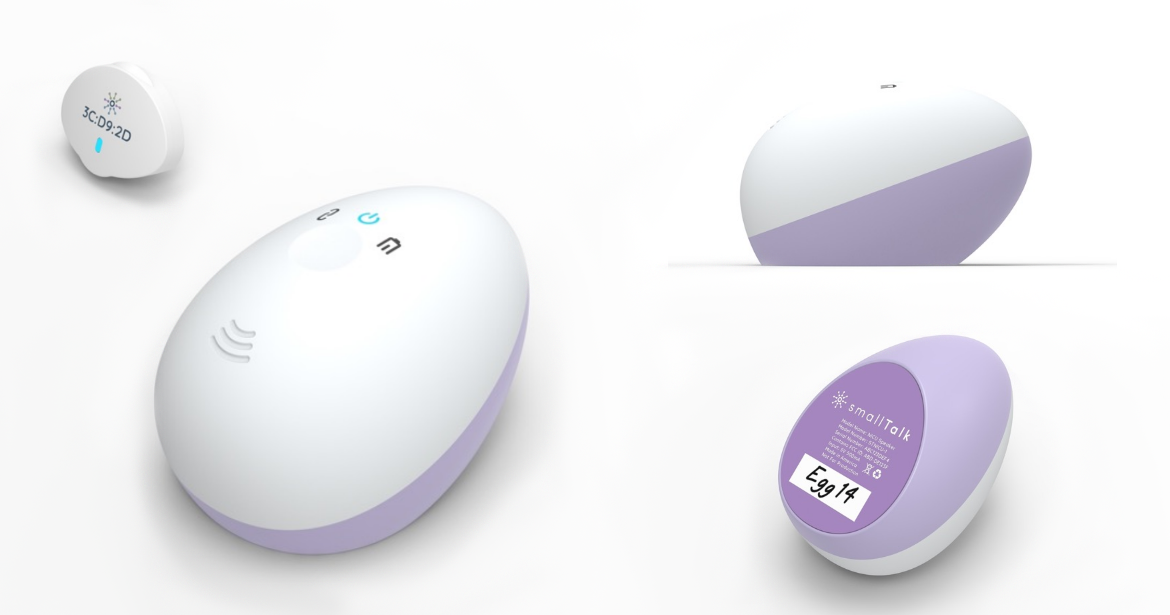smallTalk Connect: Enhancing Infant Brain Development With Interactive Maternal Voice Therapy
On a heartfelt mission to bridge the gap between babies in the NICU and exposure to their mothers and families’ voices, smallTalk® Connect addresses a long-known problem without introducing risk. smallTalk, based in Cleveland, Ohio, is a technology startup focused on brain development through early language exposure. Supported by patented technology developed at Nationwide Children’s Hospital, the smallTalk Connect is an innovative device designed to comfort and support brain development in premature babies using the warmth of their mother’s voice. According to smallTalk, a “caregiver’s voice has been shown to increase cardiorespiratory stability and growth, improve deep sleep, and even shorten the length of stay in the NICU. Premature infants exposed to higher amounts of maternal speech while in NICU sleep better, feed better, and have improved neurobehavioral and language scores at 18 months.”
NICU clinicians deeply understand this critical need for voice exposure during a baby’s first few weeks of life and empathize with the fact that parents cannot be in the NICU 24/7. Tablets, recording devices in stuffed animals, and everyday speakers have been tested in the NICU. Still, all fall short of meeting the environment's needs.
The Design:
smallTalk Connect, designed with these tiny patients in mind, checks all the boxes for NICU qualifications. The Connect can turn off independently, utilizes infant specific variables to play at an infant-safe decibel level and duration, and be sanitized easily. Via the smallTalk Connect companion app, parents make recordings and assemble playlists to be stored on the speaker for use.
Design Central is proud to have partnered with smallTalk to bring this device to fruition. Early on, the Design Central team fostered a relationship with smallTalk, which is utilizing a grant from the National Institute on Deafness and Other Communication Disorders. Design Central developed contextual understanding, including a visit to Nationwide Children’s NICU, to fully understand the needs of the environment. Through a comprehensive design and prototyping journey, Design Central helped finalize the design, fostered connections with partner firms, and managed the development and production of the first round of units. Dean Koch, smallTalk CEO, also notes that the right aesthetic driven by the Design Central team helps imply the quality and trust associated with the Connect. With the design complete, smallTalk was ready to move forward with their innovative speaker.
While smallTalk will be launching the Connect speaker device this year, additional exciting work is underway. Design Central also helped smallTalk develop a small sensor device that fits into a disposable NICU pacifier. The sensor will communicate suck strength to the speaker during a therapy session with the premature baby, providing contingent voice exposure. This version of the product is called Connect Active and is considered a medical device.
Clinical Study:
The company is currently enrolling in a randomized clinical study at Emory University in Atlanta, GA. In the study, 203 premature babies 32 weeks or older will be randomized to receive contingent voice exposure therapy once a day for 2-3 weeks with Connect Active, or to receive passive exposure with the Connect speaker. Based on previous insights, the smallTalk team and providers at Emory University are confident that all the babies participating in the study will benefit from increased comfort and stability. However, recognizing opportunities beyond comfort and stability Connect Active has the potential to revolutionize neurodevelopmental outcomes for NICU babies. The double-blind study at Emory will include an active participation element they believe can accelerate these infants’ ability to process speech. This research builds on two peer-reviewed studies demonstrating that babies experience increased brain development when they actively engage with their mother’s voice with the sensor-equipped pacifier. The results of the Emory study will form the basis of an application to the FDA.
How it Works:
Newborns have limited control over their actions, but sucking is one they can manage. smallTalk leverages this control in their active therapy sessions using a sensor-equipped pacifier. When the baby sucks on the pacifier, it communicates suck strength to the speaker. The speaker automatically sets and adjusts a threshold and provides ten seconds of voice when the threshold is hit. This daily, twenty-minute therapy aims to improve speech-sound processing, a brain measure associated with improving speech, language and neurodevelopment outcomes.
Data will be measured using brain imaging. Time-locked EEGs are taken before an infant starts the trial and after the 2-3-week intervention is completed. During the imaging work, the babies are exposed to computer-generated speech sounds or phonemes. Their ability to process speech sounds is measured by the EEG. smallTalk will use this data to support a submission to the FDA for clearance. When cleared, smallTalk’s innovation will be the first intervention to improve brain development in premature infants.
What’s Ahead:
In addition to the clinical study, smallTalk is completing a staged rollout of the Connect speaker. The feedback from the first NICU customers will help the team understand how to best communicate the Connect’s benefits to families and clinicians. This exposure is also expected to build awareness of the device and the industry's readiness for its availability in July. Healthcare professionals and parents can then request the device in their facilities and at home.
This summer, the team hopes to connect with more NICUs. smallTalk aims to improve short-term and long-term outcomes for infants across the country, showing that a mother’s voice is a powerful tool for growth and healing.
